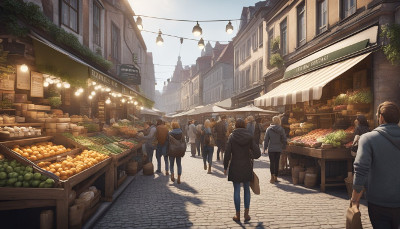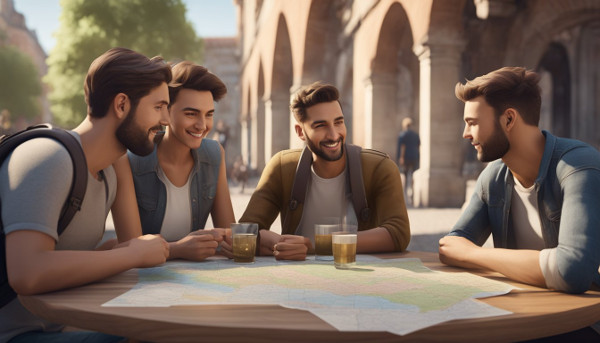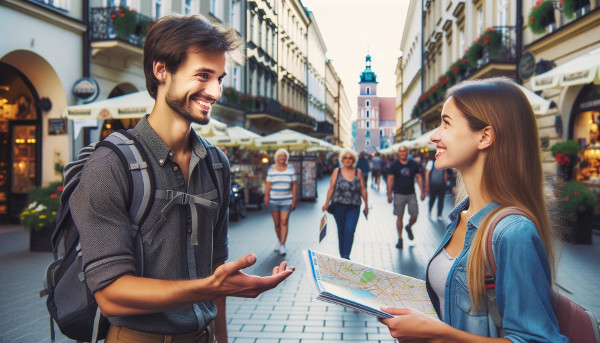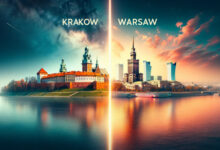Language Tips: Common Polish Phrases for Tourists
Essential Polish Phrases and Expressions for Your Visit to Poland
Planning a trip to Poland? Learning a few basic Polish phrases can make your travels smoother and more enjoyable. Poles appreciate when tourists make an effort to speak their language, even if it’s just a few words.

You can start with simple greetings like “dzień dobry” (good day) and “do widzenia” (goodbye). These versatile phrases work in most situations and show respect for Polish culture. For casual settings with friends, try “cześć” (hi) or “na razie” (see you) when saying farewell.
Don’t forget polite expressions like “przepraszam” (sorry/excuse me) and “dziękuję” (thank you). These small courtesies can go a long way in making a good impression and navigating social interactions during your stay in Poland.
Getting Started with Polish
Learning basic Polish phrases can enhance your travel experience and show respect for the local culture. Let’s explore some key elements to help you start communicating in Polish.
Understanding the Basics of Polish
Polish is a West Slavic language with a rich history and unique features. It uses the Latin alphabet with some additional letters. Polish grammar can be complex, but focusing on essential phrases will help you communicate effectively.
Polish word order is more flexible than English. Verbs change form based on tense, person, and number. Nouns have different cases depending on their role in a sentence.
Don’t worry too much about these details at first – locals will appreciate your efforts to speak their language.
Pronunciation and the Polish Alphabet
The Polish alphabet has 32 letters, including nine that don’t appear in English. These special characters are: ą, ć, ę, ł, ń, ó, ś, ź, and ż. Each has a unique sound.
Some tricky sounds for English speakers:
- ‘ł’ sounds like ‘w’ in ‘win’
- ‘cz’ is like ‘ch’ in ‘chair’
- ‘sz’ is similar to ‘sh’ in ‘ship’
Practice these sounds to improve your pronunciation. Many Polish words stress the second-to-last syllable. Listen to native speakers and try to mimic their intonation.
Essential Polish Phrases for Greetings
Learning common greetings is a great way to start speaking Polish. Here are some useful phrases:
- Dzień dobry (jen DOH-bry) – Good day
- Cześć (cheshch) – Hi (informal)
- Jak się masz? (yak sheh mash) – How are you?
- Do widzenia (doh vee-DZEN-yah) – Goodbye
Use ‘Dzień dobry‘ throughout the day in formal settings. ‘Cześć‘ is suitable for friends and casual situations. Remember to smile and make eye contact when greeting someone.
Politeness and Courtesy in Polish
Polish culture values politeness and respect. Using proper etiquette will help you make a good impression. Here are some important phrases:
- Proszę (PROH-sheh) – Please
- Dziękuję (jen-KOO-yeh) – Thank you
- Przepraszam (psheh-PRA-sham) – Sorry/Excuse me
Use ‘pan’ (sir) or ‘pani’ (madam) when addressing someone formally. For example, ‘Dziękuję, pani’ means ‘Thank you, madam’. This shows respect and is appreciated by locals.
When entering a shop or restaurant, it’s polite to greet the staff. A simple ‘Dzień dobry’ goes a long way. Remember to say ‘Do widzenia’ when leaving.
Polish Navigational Phrases
Getting around in Poland can be easier with a few key phrases. These will help you ask for directions and use public transport confidently during your travels.
Asking for and Understanding Directions
When you need help finding your way, try these phrases:
- “Przepraszam, gdzie jest…?” (Excuse me, where is…?)
- “Jak dojść do…?” (How do I get to…?)
- “Czy to daleko?” (Is it far?)
Listen for these words in replies:
- “Prosto” (Straight ahead)
- “W lewo” (Left)
- “W prawo” (Right)
- “Skręć” (Turn)
Always have a map handy. If you’re lost, show it to locals and point to where you want to go. They might use gestures along with words to guide you.
Public Transport and Getting To Places

To use buses and trams in Poland, remember these phrases:
- “Gdzie jest przystanek autobusowy?” (Where is the bus stop?)
- “O której godzinie odjeżdża następny autobus?” (What time does the next bus leave?)
- “Czy ten autobus jedzie do…?” (Does this bus go to…?)
Buy tickets at kiosks or on board. Ask “Poproszę bilet” (A ticket, please). Check timetables at stops for “odjazdy” (departures).
For taxis, say “Potrzebuję taksówkę do…” (I need a taxi to…). Always agree on the fare before starting your journey.
Dining and Shopping

Knowing key Polish phrases for dining and shopping can make your trip much smoother. These expressions will help you order food, make purchases, and handle payments with ease.
Ordering Food and Drink
When you’re ready to order at a restaurant, start with “Poproszę” (I’d like). To ask for the menu, say “Czy mogę prosić o kartę?” (May I have the menu?). If you’re vegetarian, mention “Jestem wegetarianinem/wegetarianką” (I’m a vegetarian). To order water, say “Poproszę wodę” (I’d like water).
After your meal, you can ask for the bill by saying “Rachunek poproszę” (The bill, please). If you want to toast with friends, raise your glass and say “Na zdrowie!” (Cheers!).
Remember to thank your server with “Dziękuję” (Thank you) for good service.
Shopping and Services

In shops, greet staff with “Dzień dobry” (Good day). If you need help, ask “Czy może mi pan/pani pomóc?” (Can you help me?). To ask about an item’s price, say “Ile to kosztuje?” (How much does this cost?). Read also is Krakow Cheap or Expensive and Living in UK? Here Is Why You Should Visit Krakow!
When you’re finished shopping, you might hear “Czy to wszystko?” (Is that all?). Respond with “Tak, dziękuję” (Yes, thank you) if you’re done.
If you need a size or colour, use “Czy macie to w innym rozmiarze/kolorze?” (Do you have this in another size/colour?).
Handling Money and Payments
At the till, you might be asked “Gotówka czy karta?” (Cash or card?). To pay by card, say “Kartą, proszę” (By card, please). For cash, “Gotówką” (In cash) will suffice.
If you need change, ask “Czy ma pan/pani drobne?” (Do you have change?). When receiving change, count it and say “Zgadza się” (It’s correct) if it’s right.
To ask for a receipt, say “Poproszę paragon” (I’d like a receipt). Always keep your receipts in case you need to return items later.
Polish phrases for social Interactions

Mastering a few key Polish phrases can greatly enhance your social interactions while visiting Poland. These expressions will help you connect with locals and navigate common social situations with more ease and confidence.
Meeting New People
When meeting someone new in Poland, it’s polite to greet them formally. Start with “Dzień dobry” (good day) or “Dobry wieczór” (good evening). To introduce yourself, say “Nazywam się…” followed by your name. If you want to ask someone’s name, say “Jak się nazywasz?”
To express pleasure in meeting someone, use “Miło mi cię poznać” (nice to meet you). Remember to use “pan” for men and “pani” for women when addressing people formally. For example, “Jak się pan ma?” (How are you, sir?) or “Jak się pani ma?” (How are you, madam?).
Common Phrases for Socialising
When socialising with Polish people, these phrases will come in handy:
- “Wszystkiego najlepszego!” (Happy birthday!)
- “Na zdrowie!” (Cheers!)
- “Przepraszam” (I’m sorry/Excuse me)
- “Dziękuję” (Thank you)
- “Proszę” (Please/You’re welcome)
To express your opinion, start with “Myślę, że…” (I think that…) or “Moim zdaniem…” (In my opinion…). If you need to communicate in English, ask “Czy mówisz po angielsku?” (Do you speak English?).

Emergency and Health-related Phrases
In case of emergencies or health issues, knowing these phrases could be crucial:
- “Potrzebuję pomocy” (I need help)
- “Proszę wezwać pogotowie” (Please call an ambulance)
- “Gdzie jest najbliższy szpital?” (Where is the nearest hospital?)
- “Źle się czuję” (I feel unwell)
- “Jestem chory/chora” (I am sick – use chory for males, chora for females)
If you have allergies or medical conditions, learn how to explain them in Polish. It’s also wise to carry a card with important medical information written in Polish.

Read also:
Language Practice and Resources
Learning Polish takes time and effort, but with the right tools and methods, you can make steady progress. Regular practice and immersion in the language are key to improving your skills.
Effective Methods to Learn Polish
To learn Polish effectively, start by focusing on common phrases and basic vocabulary. Listen to Polish podcasts and radio shows to train your ear. Watch Polish films with subtitles to pick up natural speech patterns.
Practice speaking with language exchange partners online or in-person to build confidence. Use flashcards to memorise new words and phrases. Attend Polish cultural events in your area to immerse yourself in the language and culture.
Write short paragraphs in Polish daily to improve your writing skills. Read Polish news websites and books suited to your level. Try to think in Polish during everyday activities to build mental fluency.

Utilising Language Learning Applications
Language learning apps can be valuable tools for practising Polish on the go. The Ling App offers lessons in over 60 languages, including Polish. It’s available on the App Store, Google Play, and as a desktop version. The app includes voice recordings from native speakers to help with pronunciation.
Start Planning Your Krakow Trip Now!
- Unsure where to stay in Krakow? Discover top-rated Old Town and Kazimierz hotels with Booking.com.
- Book your airport transfer now and enjoy a hassle-free ride directly to your hotel. Driver will meet you at John Paul II International Airport Kraków–Balice.
- Take a Tour of Auschwitz. Arrange a visit to the Auschwitz-Birkenau Memorial and Museum to pay tribute and learn about this significant historical site.
⚠️ SUMMER BOOKING ALERT: Auschwitz tours are in high demand during the busy summer season. Secure your visit now to guarantee your preferred date and time slot. Last-minute availability cannot be guaranteed during this peak season. Due to increased visitor numbers in summer, it’s strongly recommended to book your tickets and tour to Auschwitz well in advance to secure your preferred dates and times! 🔖
- Explore the Fascinating Wieliczka Salt Mine! Book your guided tour today. These tours are very popular, so book early to avoid disappointment and ensure your spot.
- Looking for ideas? Check out our KrakowTOP.org recommended itineraries, including the famous Christmas Market, holiday events, and must-see Krakow attractions like Wawel Castle, Oskar Schindler’s Factory and St. Mary’s Basilica.
Other popular apps for learning Polish include Duolingo, Babbel, and Busuu. These apps offer interactive lessons, quizzes, and vocabulary practice. Many also have language blogs with cultural insights and learning tips.
Use these apps daily for short practice sessions. Mix and match different apps to keep your learning varied and engaging. Remember to supplement app learning with real-world practice for best results.
You can be learning Polish also from YouTube video:










